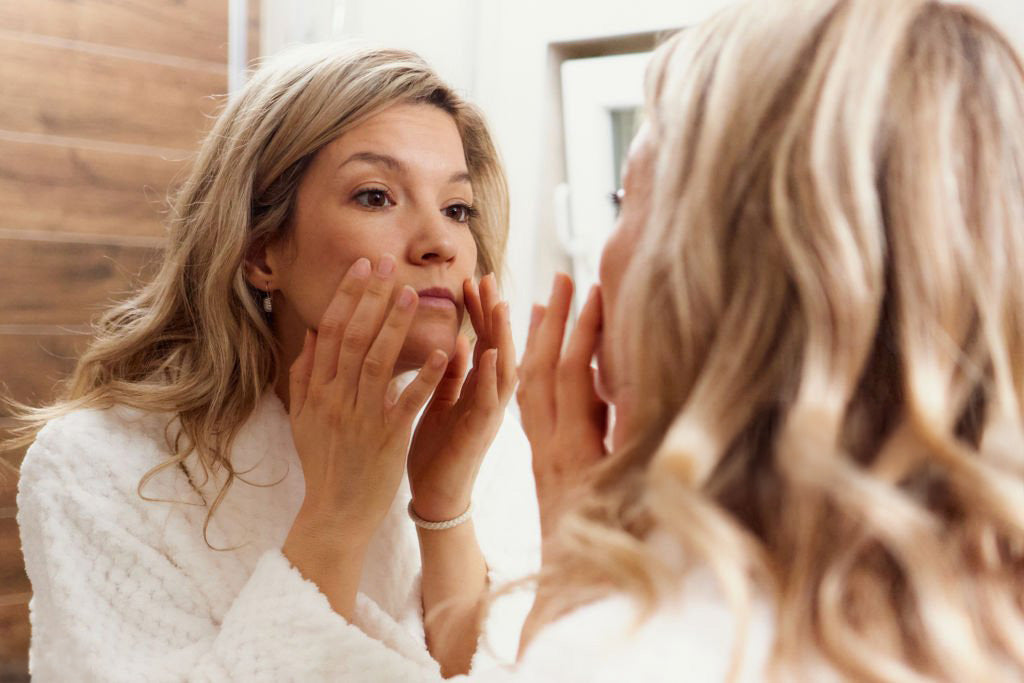As women approach midlife, many begin to notice significant changes in their skin. These shifts are often due to perimenopause—a transitional period before menopause marked by hormonal fluctuations, particularly declining estrogen levels. Understanding how to care for perimenopausal skin is crucial to maintaining its health, hydration, and youthful glow.
What Happens to Skin During Perimenopause?
Perimenopausal skin can present a host of concerns. Reduced estrogen levels directly affect collagen production, skin elasticity, hydration, and overall texture. Common skin-related symptoms include:
-
Dry skin and loss of moisture
-
Fine lines and wrinkles
-
Hot flashes that may exacerbate redness and irritation
-
Hair loss and increased facial hair
-
Dullness, age spots, and uneven tone
-
Hormonal acne due to fluctuating hormones
According to experts in women’s health and dermatology, these issues are the result of declining collagen, elastin, and natural oils, all of which are influenced by estrogen levels.
Step-by-Step Perimenopausal Skincare Routine
1. Gentle Cleansing
Choose cleansing milks or non-foaming cleansers that won’t strip the skin’s natural oils. Cleansing twice daily helps remove dead skin cells without compromising the skin barrier function.
2. Exfoliation with Care
Use mild exfoliants containing salicylic acid or lactic acid 1–2 times per week. These ingredients help with skin cell turnover and prevent clogged pores while being gentle on sensitive skin.
3. Hydrate and Lock in Moisture
Look for serums and moisturizers rich in hyaluronic acid, glycerin, and ceramides. These ingredients help lock in moisture, combat dry skin, and plump up fine lines.
4. Boost Collagen Production
Include a night cream or facial serum that contains retinol, peptides, or bakuchiol (a plant-based alternative to retinol). These compounds are proven to stimulate collagen and improve skin texture over time.
5. Sun Protection
Sun exposure accelerates aging skin. Apply a broad-spectrum sunscreen SPF 30 or higher daily. Sun protection helps prevent brown spots, skin cancer, and collagen loss.
6. Treat Hormonal Acne
If you’re struggling with adult acne, consider acne treatments with salicylic acid or benzoyl peroxide. For persistent issues, consult a board-certified dermatologist or care provider.
7. Replenish at Night
Apply a nourishing overnight cream packed with antioxidants, niacinamide, or vitamin E to help repair and restore the skin while you sleep.
What Ingredients to Look For
-
Hyaluronic acids – Deeply hydrates and plumps skin
-
Peptides – Support collagen production
-
Niacinamide – Improves skin tone and strengthens the skin barrier
-
Ceramides – Restore the skin’s moisture barrier
-
Bakuchiol or Retinol – Reduce fine lines and wrinkles
Lifestyle Tips for Skin Health
Beyond topical skincare products, holistic care makes a difference:
-
Drink plenty of water to maintain hydration
-
Eat foods rich in omega-3s, antioxidants, and vitamins
-
Avoid smoking and limit alcohol, which can dry the skin
-
Get adequate sleep to support skin renewal
-
Manage stress and support mental health to reduce flare-ups
When to Seek Professional Help
If your symptoms interfere with daily life—like severe hot flashes, vaginal dryness, or skin sensitivity—it may be time to explore hormone replacement therapy (HRT) or consult with your healthcare provider. Options like menopausal hormone therapy and prescription skincare products can offer significant relief.
You can also consult with top doctors or board-certified dermatologists specializing in menopausal skincare to personalize your treatment plan.
Final Thoughts
Perimenopausal skin doesn't have to be a mystery. With a tailored skincare routine, the right care products, and support from medical professionals, you can manage skin changes during menopause and maintain a healthy glow. Pay attention to how your skin looks and feels, and don’t hesitate to seek help when needed.
This article is for informational purposes only. Always consult a qualified healthcare provider or dermatologist for medical advice tailored to your specific condition.



